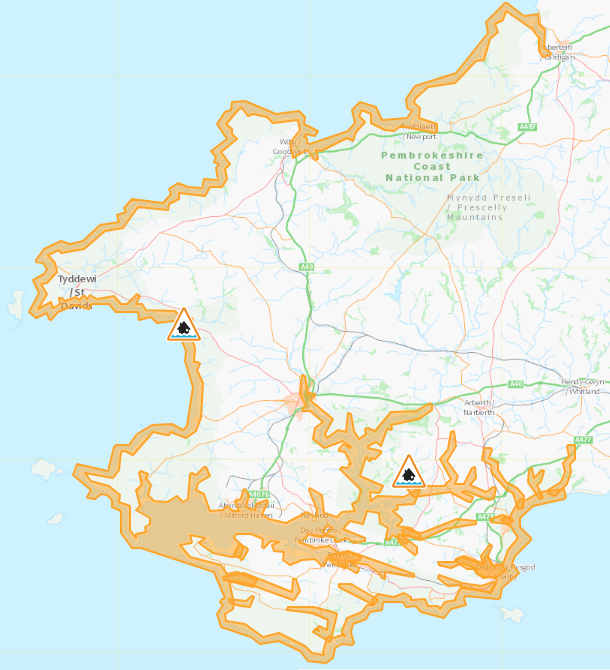News
Economy Minister vists Pembrokeshire as tourism businesses gear up for Easter

AS TOURISM businesses across Wales gear up for Easter, Economy Minister, Vaughan Gething, visited businesses in Pembrokeshire who are looking forward to welcoming visitors following new developments and investment.
The team at Folly Farm have had a busy winter working on new attractions to keep the visitor experience fresh for new and returning guests. A new accommodation development has had funding from the Welsh Government and the Minister had the opportunity to see one of the luxury lodges which will open to the public in the summer
A further eight safari lodges will arrive at the end of the year, which will overlook the rhino enclosure. The Minister also had an opportunity to see the Touring and Camping Park which has this week received a 5 star Visit Wales grading.
In addition to the accommodation, other developments, include a new indoor soft play area, eight brand new Takeuchi mini-diggers for the Big Dig attraction supplied by J Davies of Lampeter, a new native species enclosure on the zoo, extensive themed development for the rare breed paddocks and new land train carriages.
Chris Ebsworth, managing director at Folly Farm, said: “We’re looking forward to a busy Easter and Summer season at the attraction having had a record-breaking February half term. Advanced bookings for our accommodation are strong and we’re looking forward to our first full season of operation in two years. A heavy level of investment this Winter means there’s lots of new attractions to see and our usual annual maintenance plan means everything is looking fabulous!”
The Economy Minister said: “It’s been an incredibly difficult couple of years for the visitor economy. Two years ago, we had to take the very difficult decision to restrict people’s travel in order to keep Wales safe from Coronavirus, which meant tourism businesses weren’t able to welcome visitors for Easter.
“However, research now shows there is higher confidence and comfort levels, and the UK public anticipate taking significantly more overnight trips in the next 12 months, than the previous 12 months.
“Visit Wales marketing campaigns have been keeping Wales front of mind throughout the winter, as people regain confidence and look ahead to booking holidays.
“Since the start of the pandemic, the Welsh Government has pulled every lever possible to back Welsh businesses. We’ve provided in excess of £2.6bn funding to Welsh businesses, in a package has helped protect in excess of 160,000 Welsh jobs which might otherwise have been lost. We also extended our 100% business rate relief package for retail, hospitality and leisure businesses until the end of March 2022. To support businesses over the next 12 months, we’re providing a £116m package of non-domestic rates relief for businesses in the sectors most directly affected by the Covid-19 pandemic. This means retail, leisure and hospitality ratepayers in Wales will receive 50% non-domestic rates relief for the duration of 2022-23.
“In recovering from the pandemic, our ambition is to grow tourism for the good of Wales and to do this we will grow tourism by extending the season, promoting Wales during less busy times of the year and promoting areas of Wales which are quieter.”
One of the challenges facing the sector following the pandemic is recruitment, as many businesses are seeing a shortage of staff. The Welsh Government has been working with the sector on a recruitment campaign to highlight the range of personal development opportunities and potential career paths on offer in the sector. Folly Farm and The Grove of Narberth have worked with Visit Wales on the Experience Makers campaign to highlight roles are careers.
The Minister also visited the Grove of Narberth. The five-star hotel is part of Seren collection in Wales, and the portfolio of venues has been working hard to address the recruitment issues facing the sector.
At the start of 2022 flexible working practices were introduced, meaning that all staff can work to a four-day-a-week rota with no adjustment to salary, whilst being paid for any extra shifts. Those staff who wished to remain on a five-day week, also had the option to do so. It follows the introduction of a four-day week for chefs at the hotel in 2016. The business has also introduced a profit sharing scheme where members of staff will share in the ongoing success of the business, alongside other staff package improvements including long service holiday rewards.
Neil Kedward, Managing Director of Seren, said: “We’re delighted to have made this progressive and important change for the individuals across our businesses Grove of Narberth, Coast Restaurant in Saundersfoot, and Beach House Restaurant in Oxwich. We are already seeing the impact of this change in helping our teams find real balance in their lives, having more quality time with family and friends, and feeling energised and more focused on achieving their goals at work. We have invested significantly over the years to get the product right in each venue, and so now we are well placed to invest much more in our people.”
The Minister added: “As we build a stronger, fairer, greener Welsh economy.We are committed to investing in our people, through the Young Person’s Guarantee and a strong employability and skills offer, including apprenticeships. Apprenticeships can help futureproof, motivate and diversify a workforce – offering people the chance to gain high-quality vocational skills. They are also crucial to our ambitious post-Covid economic recovery plans. That’s why we have committed to creating a further 125,000 all-age apprenticeship places over the next five years.”
Community
Wales launches plan to become ‘Carer Aware’ nation

Consultation invites unpaid carers across the country to shape new national strategy
THE WELSH GOVERNMENT has unveiled plans to make Wales a “Carer Aware” nation, with a new public consultation launched today (Monday, Feb 2) aimed at improving recognition and support for the country’s thousands of unpaid carers.
Ministers say the move is designed to ensure people who look after relatives, friends or neighbours are identified earlier and treated as partners in decisions about the care of their loved ones.
A draft National Strategy for Unpaid Carers has been developed with input from hundreds of carers and representative groups across Wales. It sets out eight key priorities, including better recognition of carers’ roles, improved access to respite and short breaks, stronger wellbeing support, and measures to prevent young carers from carrying too much responsibility.
Under the proposals, carers of all ages and backgrounds — including disabled carers and those in minority communities — would be able to access clear, local information and help when they need it.
Officials say earlier identification is critical, so carers can receive advice, financial guidance and emotional support from the start of their caring journey, rather than only at crisis point.
The strategy also stresses the need for sufficient alternative care arrangements to allow carers time to rest and protect their own health.
Dawn Bowden, Minister for Children and Social Care, said many carers do not even see themselves as carers.
“Too often, unpaid carers go unrecognised – even by themselves. They’re simply ‘looking after mum’ or ‘helping out a friend’, but caring can have a profound impact on people’s finances, careers, health and wellbeing,” she said.
“We want Wales to be a place where carers are identified early, where they know their rights, and where they’re treated as partners for the person they care for.
“This consultation is important in shaping a strategy which takes into full account how carers feel and how they’re supported. I’d encourage everyone with an interest to provide their views.”
The consultation is open now and runs until April 13, with responses helping to shape the final strategy and future support services across Wales.
People can take part online via the Welsh Government website.
News
Bus services reform becomes law across Wales

Landmark legislation gives public sector greater control as rollout set to begin in southwest Wales in 2027
LOCAL bus services across Wales are set for their biggest overhaul in decades after new legislation formally became law this week.
The Bus Services (Wales) Bill received Royal Assent on Monday (Feb 2), with the Welsh Government saying the changes will transform how routes are planned and delivered, putting passengers and communities ahead of profit-led timetables.
The legislation was sealed at a ceremony in Cardiff by First Minister Eluned Morgan, marking what ministers describe as a “historic day” for public transport.
The law gives the public sector a stronger role in shaping bus networks, allowing services to be designed around local needs in both rural and urban areas. Instead of relying solely on commercial operators deciding routes, councils and regional bodies will be able to coordinate and plan services more directly.
The Transport for Wales will work alongside local authorities, Corporate Joint Committees, bus companies, unions and residents to redesign networks using local knowledge.
Buses remain a vital link for many communities, particularly in rural parts of west Wales where alternatives are limited. They connect people to jobs, schools, hospitals and town centres.
Eluned Morgan said: “This is a historic day for public transport in Wales – it sends out a clear message that we are committed to improving the bus system and delivering better, more reliable services for the people of Wales.
“Buses are lifelines for many communities across Wales connecting people to jobs, health services, education and friends, and I’m excited to see the improvements that are coming.”
Cabinet Secretary for Transport and North Wales, Ken Skates, said the changes marked “the beginning of a new era”.
He added: “These changes won’t be seen overnight, it’s going to take time, but we are working closely with the industry and local authorities to plan and deliver bus services to meet the needs of passengers today and for generations to come.”
The rollout will be phased, starting in southwest Wales in 2027, followed by north Wales in 2028, southeast Wales in 2029 and mid Wales in 2030.
Ministers say the aim is to deliver more reliable timetables, better coverage and services that reflect what communities actually need – rather than what is most commercially viable.
Community
Flood alert issued for Pembrokeshire coast this evening

Pembrokeshire residents are being urged to prepare for possible flooding along the coastline between St Dogmaels, Cardigan and Amroth, after Natural Resources Wales issued a Flood Alert.
The alert warns that rising water levels could pose a risk to homes, vehicles and livestock, and advises people to take precautions now. Authorities are reminding residents to follow their flood plans, check on family, friends and pets, and ensure essential items and documents are protected.
Residents are also advised to keep mobile phones charged, know how to turn off electricity, gas and water supplies, and prepare a small emergency bag with items such as medication, warm clothing, baby and pet care essentials, and insurance documents. Vehicles, livestock and equipment should be moved from areas likely to flood if possible.
Safety warnings are clear: do not drive or walk through floodwater. Just 30 cm (1 foot) of water can carry a car away, and 15 cm can knock a person off their feet.
For more information, residents can visit Natural Resources Wales – Flood Warnings, check river and sea levels online, or contact Floodline on 0345 988 1188 (quick dial 503013). Updates are also available via @NatResWales on social media.

-

 Health4 days ago
Health4 days agoConsultation reveals lack of public trust in health board
-

 News5 days ago
News5 days agoCaldey still unsafe, survivors warn — despite Abbey’s reform claims
-

 Community5 days ago
Community5 days agoPembrokeshire students speak at national Holocaust Memorial Day event
-

 Local Government7 days ago
Local Government7 days agoTribunal over former Neyland councillor’s conduct adjourned
-

 News5 days ago
News5 days agoKurtz raises Gumfreston flooding in the Senedd as petition deadline nears
-

 Community6 days ago
Community6 days agoStorm Chandra: Morning impacts across Pembrokeshire
-

 Entertainment6 days ago
Entertainment6 days agoRapunzel brings festive magic to Torch Theatre
-

 Education5 days ago
Education5 days ago‘Vulnerable teen’ questioned by police at Milford Haven School

























